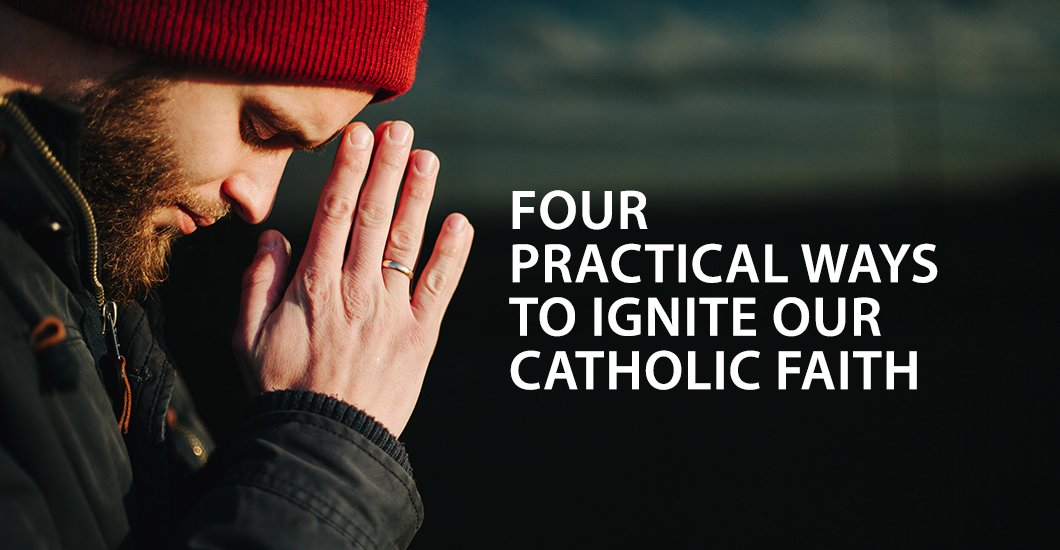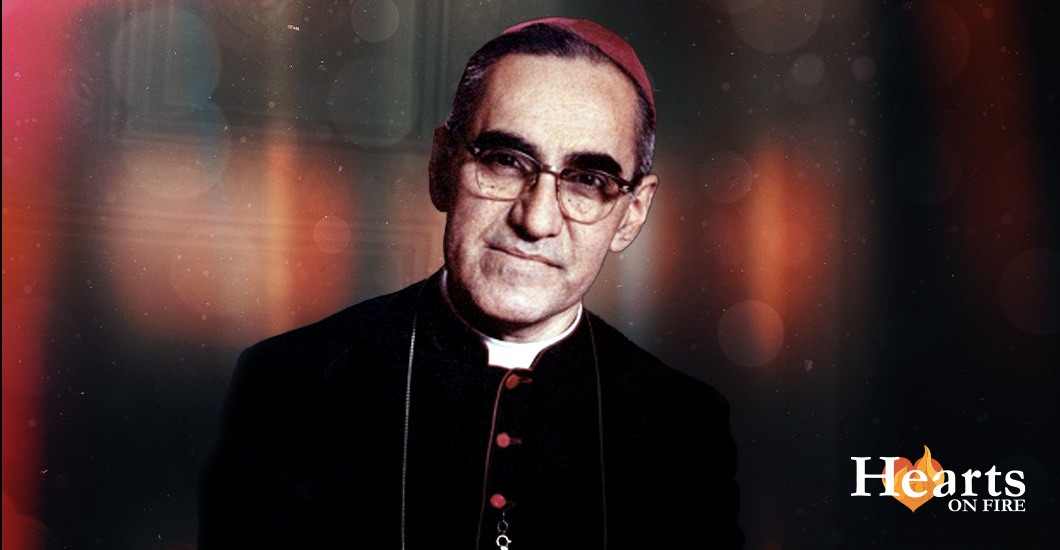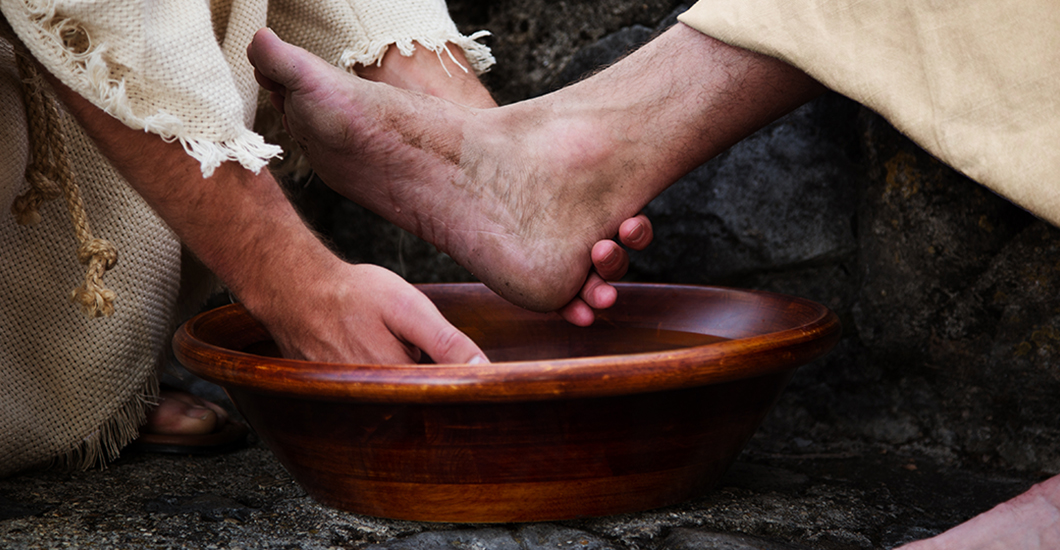Trending Articles
Four Practical Ways to Ignite Our Catholic Faith
“You are the light of the world. A city set on a mountain cannot be hidden. Nor do they light a lamp and then put it under a bushel basket; it is set on a lampstand, where it gives light to all in the house. Just so, your light must shine before others, that they may see your good deeds and glorify your heavenly Father.” — Matthew 5:14-16
I first encountered Katie Peterson Warner years ago when she was a teenager in my parish. I have always been impressed with her zeal for the Catholic faith and the Christ-inspired joy she authentically shares with anyone she encounters. Some people have a “magnetic” personality, but Katie is something altogether different. People genuinely feel happier and more excited about their faith when they encounter her, and she is a natural at sharing her Catholic faith with others. This is a rare gift.
Katie grew up in a loving Catholic home with her parents and two sisters. Katie describes her early passion for the faith this way: “Ever since I was in junior high, I have wanted evangelization to be not only my personal mission as a baptized Catholic but also my career. I was raised in a devout Catholic home, but I received an even stronger calling to serve the Church during a profound heart-to-heart with Jesus in front of the Eucharist in the eighth grade. Since that time, I have not wavered in my desire to study theology and catechesis, so that I could articulately and knowledgably teach the faith.”
After graduating from Kennesaw State University with degrees in communication and writing, Katie pursued a graduate degree in Catholic theology, specializing in evangelization and catechesis, from the Augustine Institute in Denver, Colorado, where she graduated summa cum laude. She worked her way through school as the communications manager for CatholicsComeHome.org. Her intention upon graduation was to use her speaking, writing and teaching skills to serve the evangelization mission of the Church.
Katie shared with me that during her college and grad school years, the Holy Spirit presented her with numerous opportunities to speak and write—on a scale that was much larger and more frequent than she could have ever expected or was prepared to do. She has spent the past few years writing more frequently and speaking nationally, and she now realizes that this is part of the “little role God wants me to play in the building of His kingdom.” When I interviewed her for my book “Joyful Witness,” she had the humility to say she has been “undeservingly blessed in experiencing what it’s like to watch God’s will—albeit sometimes His seemingly scary will—unfold in my life in the most unexpected and adventurous way.”
We hear so much today about losing our Catholic young people into the spiritual wilderness for a long period of time with hopes that they will eventually come back, but Katie managed to stay true to the Catholic faith, even through the tumultuous teen and college years. It is remarkable that this young woman stayed on the right path. How?
Katie gives all the credit to God and says it has always been clear to her that God’s grace covered her like the “shield of faith” described in Ephesians 6:16, and this kept her focused on pursuing a relationship with Jesus Christ and His Church during a period of life generally filled with worldly temptation, insecurity and doubt. She says:
“I knew, however, that I had to cooperate with that grace, and so it was in high school that I discovered the treasure of daily Mass. I made an effort to go really early every morning before school started. I have been a daily Mass-goer for a joyous ten years now, and I cannot even begin to describe the spiritual riches I have received over the past decade as a result. Daily Mass was a game changer for me. When I was looking for more clarity and purpose in my life, answers to God’s plan for me, peace in the midst of school and work stress, comfort in the midst of social turmoil and now strength to live out my calling more virtuously as a wife and mother, I turned to the Eucharist in Holy Mass and in Adoration. I thank God that He helped me develop that habit in my teen years; I wouldn’t be the person I am today without the Sacraments.
In addition to frequenting the Sacraments I studied. I studied the faith, all the time. I scoured books and Catholic CDs. I attended frequent talks and practiced evangelizing my peers—and frankly anybody—when opportunities presented themselves. The more I learned about my faith, the more I knew about it. The more I knew about my faith, the more I loved it. The more I loved my faith, the more I shared it. The more I shared my faith, the more I treasured it. Finally, I prayed. A lot.”
Daily Mass for more than 10 years, devoted to the Sacraments, passion for studying the faith, a prayer warrior—who among us (or our children) would not be transformed by following Katie’s example? What would happen if Catholic parents, through their personal example, led their families to the same kind of devoted practice of our faith? When I asked Katie about the causes for this faith crisis among our youth, I was grateful for her direct answer, rooted in careful study and firsthand experiences from her travels around the country:
“It’s hard to say it, and people don’t like to hear it, but parents are arguably and statistically one of the greatest reasons for the loss of faith practice among young people today. Parents are meant to be the primary educators of the faith for their children—not Sunday school catechists, not Catholic schoolteachers, not the parish priest—parents and parents are dropping the ball big time. Researchers say that if you want to see what a young person’s faith life will look like as an older adult, just look at their parents. When parents aren’t living out their Catholic faith at home, their children suffer the consequences. They don’t see the importance of the faith; their parents don’t engage, so they don’t. The home is meant to be the nucleus of Catholic culture and parents need to take much more seriously their responsibility to make it so. When parents live like the secular culture around them, their kids start to think they can live adequate lives without the church, and they drift away.
Second, our post-modern, relativistic, materialistic culture poses a serious threat to young people today, convincing us to adhere to moral therapeutic deism, which makes the central goal of life to feel good about oneself, rather than to follow the path that Jesus Christ has for us, which is the only path that can offer us true happiness. Additionally, parishes around the country are facing a huge deficit in trained youth ministers. The vast majority of parishes don’t have a full-time youth minister at all. Finally, Catholic schools are now often places where young people say their faith is lost rather than nurtured.
All of these factors ultimately contribute to a weakened experience of authentic Catholicism in a young person’s formative years, which makes it easier for them to simply disengage when they confront the shallowness of their faith, marry outside the church, fail to have their questions and doubts addressed, misunderstand the church’s teachings on moral issues or the significance of the Mass, and so on.”
Katie’s own parents have been very influential in nurturing and encouraging her spiritual life. Her father, Tom Peterson, is well known for the evangelization work he does in helping invite souls home to the Catholic church through TV commercials from the Catholics Come Home apostolate. Countless babies have been saved from abortion through pro-life TV commercials from his VirtueMedia.org ministry. Katie witnessed her father go from being a successful, wealthy businessman to a pro-life Catholic ministry founder; this taught her from a young age that God has extraordinary plans for our lives if we are willing to say “yes” to His call. However, Katie says the hidden hero of her home is her mother Tricia. “I have never met anyone more prayerful, more trusting, more deeply in love with Jesus Christ in the most humble and profound way. She is a model of offering up sufferings to our Lord and laying one’s life entirely in His hands. Every day, she teaches me something more about love and joy and she, in my eyes, is a living saint.”
I asked Katie how we can do a better job of engaging our Catholic youth and helping them get back on track. She offered four specific actions for us to consider:
‘You simply cannot love the whys of Catholicism before you love the Who. Many young Catholics today have been catechized without being evangelized. They have not truly encountered an authentic relationship with Jesus or His Church, so all of the teachings and practices of the faith fall on deaf, uninterested ears. You simply cannot love the whys of Catholicism before you love the Who. Young people need to be re-evangelized and in the past few years, I have traveled to many Catholic groups convincing younger and older adults alike that they (and by that I mean we—each and every baptized Catholic) are the ones tasked with evangelizing them.
We need to become more convincing disciples of Christ. We need to talk more candidly about our Catholic faith when the Holy Spirit presents us with people and opportunities to do so (which is frequently when we ask Him to). We need to make love for young people our primary motivation and develop relationships—not just simple one-time evangelistic moments—with them through discipleship. We need to listen carefully and discerningly to their doubts and reasons for leaving or wanting to leave the Church, keeping in mind that the reasons they give are not often the real reasons keeping them at bay. This might require us to do a little digging to get to the root cause, so that we can effectively evangelize them “where they are.” We need to play offense, not just defense—we need to ask questions, not just answer them.
We need to pray like crazy. We should make it our daily mission to pray for the souls of our young people—through rosaries, chaplets, fasting and heartfelt love notes to God for the young individuals He has entrusted to our care in some way.
We need to exhibit authenticity and joy. There is so much inauthenticity in our lives today—pseudo relationships through social media, the constant barrage of advertising, false images of beauty and happiness on TV and in magazines—all aimed directly at young people. They need something that is real, and they need us to be the ones to show them that “realness.” Second (and my personal favorite) is the exhibition of joy—true, unbridled joy. I have had, thanks be to God, many people tell me that, even more than what I say about my faith, they notice the joy with which I say it. Joy is contagious. Be joyful and you will spread joy. Be joyful about your faith and your Catholic faith will catch fire in the lives of those you evangelize. Not enough people are joyful about their Catholic faith, when that is precisely the thing we should all be most joyful about, regardless of our age.
Now married, Katie and her husband, Raymond, have welcomed two beautiful children into the world in the last three years. Katie says without a doubt her favorite ministry work is family life.
“Nothing in my life could have prepared me for the spiritual journey that is marriage and motherhood. It is, without question, both the hardest and most rewarding work I have ever done. Speaking, writing, working for apostolates—I love that ministry. But it’s in building up the domestic church that I have realized that I have—everyone has—the greatest power to change the world. My husband and I can model the life of the Trinity in our relationship and be evangelists to our relatives, friends, neighbors and coworkers simply through the way we love each other. Through parenthood, we can raise saints who can go out and transform the culture in which we live. What a gift, and what a responsibility! The home is where the New Evangelization begins and the reason why it thrives.”
As a young married Catholic adult with young children, Katie is joyfully fulfilling the vocation of wife and mother. But how do her choices impact her role in the new evangelization? What lessons are here for others facing similar choices? She admits the road has been difficult at times:
“Over the past few years, I have had to make difficult decisions that meant me giving up jobs that I loved, places I wanted to be and ministry opportunities I wanted to take advantage of for the sake of my family. Despite my usual, uncomfortable initial reactions, when I make a choice that is for the benefit of our family, I am amazed at how God works through that. We grow in virtue and I grow more accustomed to following God’s will for me, rather than my will for myself. No matter how hard I sometimes resist, it is easy for me to see—albeit often in hindsight—that His will always makes me happier.
Dedicating yourself to your family often involves receiving intangible blessings, which can be difficult for people like me who are used to finishing job tasks on their running to-do list, being recognized for a project well completed and working in the field of evangelization (or any workplace for that matter) where people can see and acknowledge what you are doing. Committing myself to my home life first—to my spouse and to my children—helps me focus more on being. I try and ask myself every day, “How much a better wife and mother can I be today?” rather than, “How much can I get done today?” Transitioning to a mindset of seeing new growth in patience as a “job well done” for the day (rather than a work assignment neatly wrapped up, for example) is a regular struggle for me, but it’s a struggle that I need and desire in my life.
Family life helps us focus on the people we need to become in order to be saints. What a training program—what a gift! When my husband and I pray together, when my infant son smiles at me as I make the Sign of the Cross on his forehead (and eagerly await the day I can teach him what it means!), I feel the indescribable joy that Pope Francis articulated when he said in his Angelus address (July 26, 2013) “How precious is the family as the privileged place for transmitting the faith!”
In addition to her vocation as a wife and mother, Katie continues to work part time for Catholics Come Home, disseminates resources for Catholic individuals and couples through CatholicKatie.com and writes for online Catholic publications. She also published her first, inspiring book, “Head & Heart: Becoming Spiritual Leaders for Your Family” (Emmaus Road Publishing), which has offered countless couples practical strategies for living out their faith more intentionally at home, together with their families. This portion on Katie Peterson Warner’s life will stop here, for now, but please reflect on this powerful image shared by Katie as we consider what God’s plan is in our own lives:
“I’ve heard that Saint Teresa of Calcutta once described herself as a little pencil in the hand of God. I love that image. We’re just instruments, tools that God uses to communicate Himself to others. I think that God has placed a call on my heart to communicate Him to others—at least in some small way—through writing and speaking. Others are called to write God’s love on hearts in other unique ways. But all of us are special in as much as we are one of His pencils.”
Four Ways to Ignite Our Catholic Faith
There are basic lessons woven into Katie’s story that are doable for everyone. Here are four of them:
- Live up to the expectations of your vocation. What are we called to do? What is God’s will for our lives? Katie experienced a call to evangelization after much prayer and time before the Blessed Sacrament at an early age. She later added that her most important vocation is as a Catholic wife and mother. We, also, can spend time in prayer exploring God’s plan for our lives and responding to His call. In this way we gain an opportunity to draw closer to Him and set our feet securely on our journey to heaven.
- Be a lifelong student of Catholicism. Katie has been studying our faith since she was very young and has never stopped. Do we take advantage of the great teachings of our church? Do we read Scripture, the “Catechism,” lives of the saints with lives of the Saints, writings of our popes and other great theologians? If we want to learn about our faith, we must be students of our faith. If we wish to share our faith with others, it must come from a place of deep understanding and love for what we have learned.
- Recognize the power of personal example. Are we pursuing lives of holiness? Do we chase what the world offers or are we focused on our heavenly home? As Katie pointed out, we have an enormous responsibility to model the Catholic faith for our children—they will practice their faith much the way we do. Be aware of opportunities to be the light of Christ and a joyful witness to your children as they become adults—as well as friends, loved ones and anyone else we encounter.
- Be a Catholic multitasker. We are not meant to use our jobs and busy family lives as the excuse for not going deeper in our faith. Work and family life provide unique opportunities for bringing our authentic Catholic selves into every area of our lives. When we set our priorities with God, all the aspects of our lives begin to revolve around that center.
Questions for Reflection:
◗ Do I have a better idea of how to stay focused on growing my Catholic faith after reading Katie’s story? What resonated best with me?
◗ Am I making excuses for how I live out my Catholic faith because of work, family or other areas of stress? How might I lead a more integrated Catholic life?
◗ Do I spend time talking to God and deepening my relationship with Him? Do I faithfully observe the sacraments? If not, what is getting in the way?
◗ Do I know what I am called by God to do? If not, am I just guessing or am I asking God in prayer for help and guidance?
Randy Hain is the president of Serviam Partners Consulting/Coaching. He is the senior editor for the Integrated Catholic Life™, which he cofounded with Deacon Mike Bickerstaff in 2010. Hain is a prolific writer and frequent presenter on a number of topics including faith, family, Catholic men’s issues, fatherhood, faith/work integration, careers, authenticity, leadership and human capital. His latest work is “Special Children, Blessed Fathers: Encouragement for Fathers of Children with Special Needs.” A convert to the Catholic Faith in 2006, Hain and his wife have been married for twenty years and have two teenage sons.
Latest Articles
Want to be in the loop?
Get the latest updates from Tidings!








